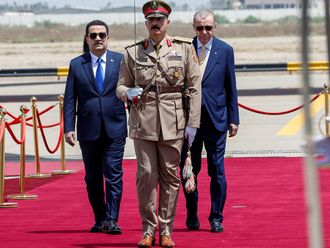Occupied Jerusalem: Defence Minister Ehud Barak, who stunned the country by announcing his retirement from politics yesterday, is a stalwart of Israeli politics and a former prime minister with a legendary military career.
A liberal leader who once headed Labour, Barak nonetheless agreed in March 2009 to lead his party into the hawkish rightwing government of Prime Minister Benjamin Netanyahu.
His sudden decision to conclude his storied career at the age of 70 comes in the wake of a week-long air campaign in Gaza that the Israeli media said Barak was keen to conclude by signing up to an Egyptian-brokered truce.
Some in the government opposed that truce, and Barak has come under increasing pressure from Netanyahu’s Likud party, much of which opposed his continuing position as defence minister.
“I have decided to resign from political life and not participate in the upcoming Knesset elections,” Barak told a press conference in Tel Aviv.
“I will finish my duties as defence minister with the formation of the next government in three months,” he added, saying that he wanted to spend more time with his family.
The shock announcement came amid speculation that Barak — anxious to break ties with the more rightwing leaders of the ruling coalition - would announce his decision to join another party ahead of the snap January 22 elections.
His retirement also coincides with Israeli attempts to push the international community to exert more pressure on Iran over its contested nuclear programme.
Israel and much of the West believes the programme is an attempt to build a nuclear weapon, and Netanyahu and Barak have been among the loudest voices in Israel warning that the state could take preemptive military action against Tehran.
First appointed defence minister in June 2007, Barak brought Labour into Netanyahu’s government after his party was drubbed in 2009 elections.
In 2011, he quit the party where he had spent his entire political career, forming the tiny Independence faction to stay in the government and his post as defence minister.
Before his split with Labour, party members publicly expressed their anger over his decision to remain in the government despite the failure of peace talks.
It was the second major comeback for the former chief of staff, who withdrew from politics altogether after his 1999-2001 premiership, having tried and failed to make peace with then-Palestinian leader Yasser Arafat.
He had offered unpopular concessions on occupied east Jerusalem, wanted by the Palestinians as the capital of a future state, only to see Arafat spurn the offer and Israeli voters punish him with a resounding endorsement of veteran rightwing challenger Ariel Sharon.
As premier, Barak oversaw Israel’s withdrawal from south Lebanon in 2000 after a two-decade occupation.
In 2007, he won back Labour’s leadership from Amir Peretz after the latter resigned as defence minister following Israel’s disastrous war with Lebanon’s Shiite group Hezbollah the previous year.











